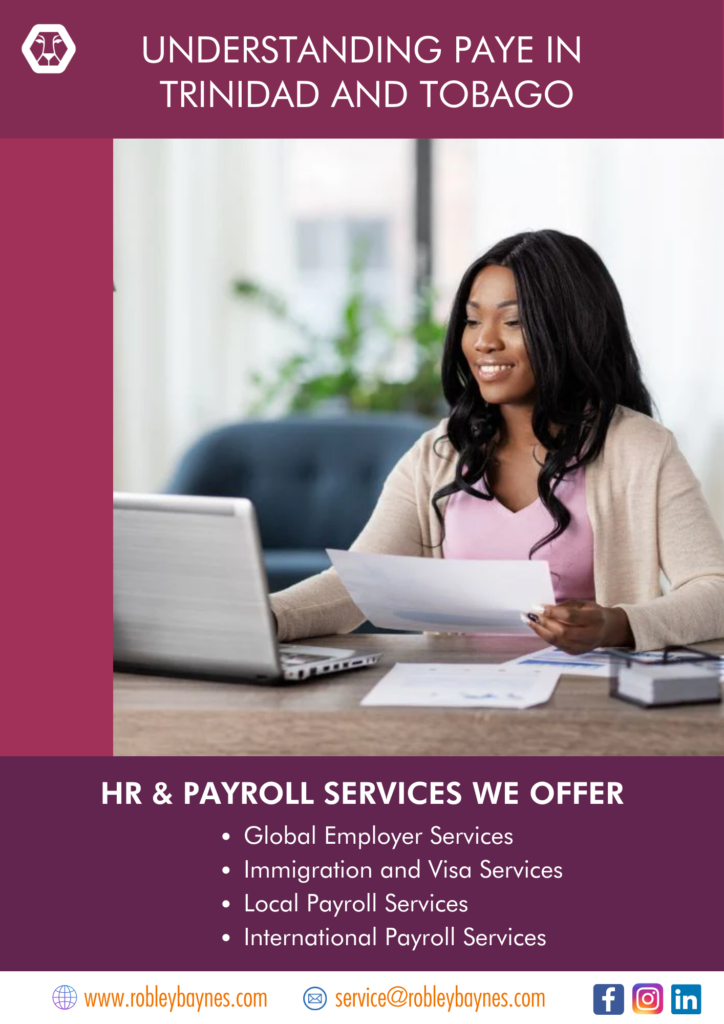
If your business/company employs persons, then it’s likely you’ll need to register under PAYE so they can pay tax to the Board of Inland Revenue.
What is PAYE?
PAYE is a Board of Inland Revenue (BIR) automated system for collecting income tax payments from employed persons throughout Trinidad and Tobago.
What Does PAYE Mean?
PAYE also known as Pay-As-You-Earn, is a tax paid to the BIR once you cross the monthly income barrier of $7500 or annual earnings of $90,000 (Effective of Jan 1st, 2023) you pay 25% of the added value. As an employer you pay employees’ taxes to BIR directly from their salary. This means that when an employee receives their salary, all their deductions for tax and payments like standing orders or loan deductions would be paid automatically.
What is the PAYE tax?
Employers collect PAYE tax from employees’ wages and pay it to BIR monthly. The PAYE tax is paid on the 15th day of the following monthly. NB: Self-employed individuals (Sole Trades) must make quarterly payments by the last day of each quarter (end of March, June, September, December). A BIR file number/code would be given to each person who applies to the BIR. This will allow employers to know which account to file the tax to.
Responsibilities of the Employee
1. Submit a TD1 Form (tax declaration form) to his/her employer.
2. Submit a TD1 Form to the Board of Inland Revenue for approval.
3. Submit BIR file number to his/her employer.
Responsibilities of the Employer
1. Deduct taxes from emoluments income
2. Remit taxes to board of inland revenue.
3. Issue pay slips.
4. Submit PAYE monthly return.
5. Issue td.4 certificates.
6. Keep records of employees’ earnings.
Responsibilities of the BIR
1. Provide Tax Deduction Tables and Instructions for ensuring correct deduction of taxes.
2. Provide literature and guidelines to ensure the proper administering of the system.
3. Help whenever necessary or requested.
Can You Operate PAYE Yourself?
If you want to run your own payroll, you’ll need to register as an employer with the BIR and receive your employer file number.
Operating payroll yourself is the cheapest option, but it can be time-consuming if you don’t have experience of the PAYE system.
There are a range of rules you’ll need to follow, such as keeping six years’ worth of records on all employees and paying BIR the correct amount of tax.
An employer who fails to deduct and remit the amount deducted from his employees, after the statutory date will be liable to –
*A penalty of 25% of the deduction or $40.00 whichever is greater and interest on both the amount deducted and the penalty at the rate of 20% per annum from the due date to the date of payment.
A fine of thirty thousand dollars ($30,000.00) or imprisonment for two (2) years or both, upon summary conviction.
Paying for someone to operate your payroll.
You can complete Payroll yourself, however it would be less time consuming to pay an accountant to do it for you.
Us at Robey Baynes Tax and Accounting Services provide the best payroll service throughout Trinidad and Tobago. Our trained and certified Payroll and Taxation experts take you through the step-by-step process of understanding payroll and the management aspect of it. Get started today by engaging with one of our representatives via email at service@robleybaynes.com .
